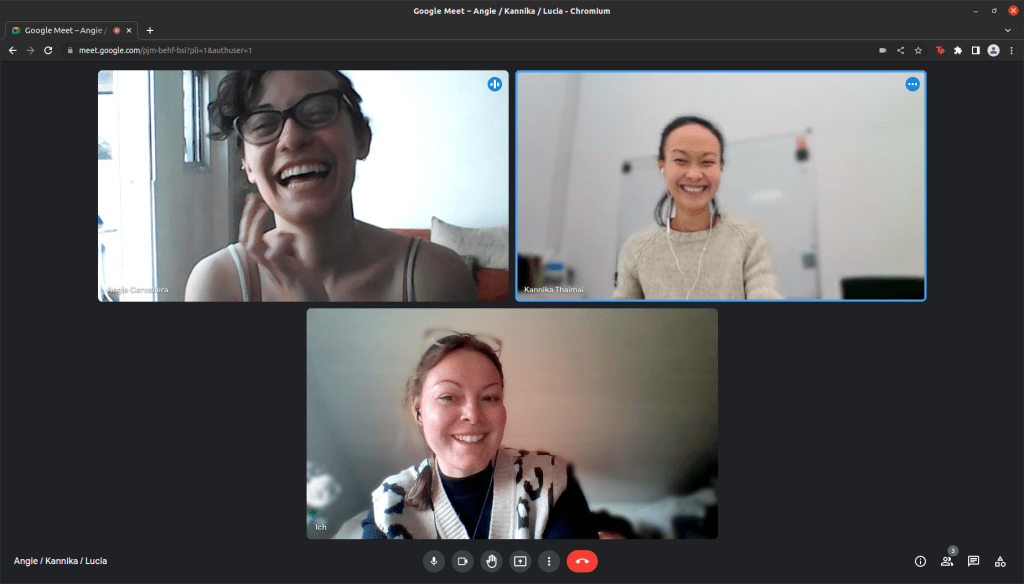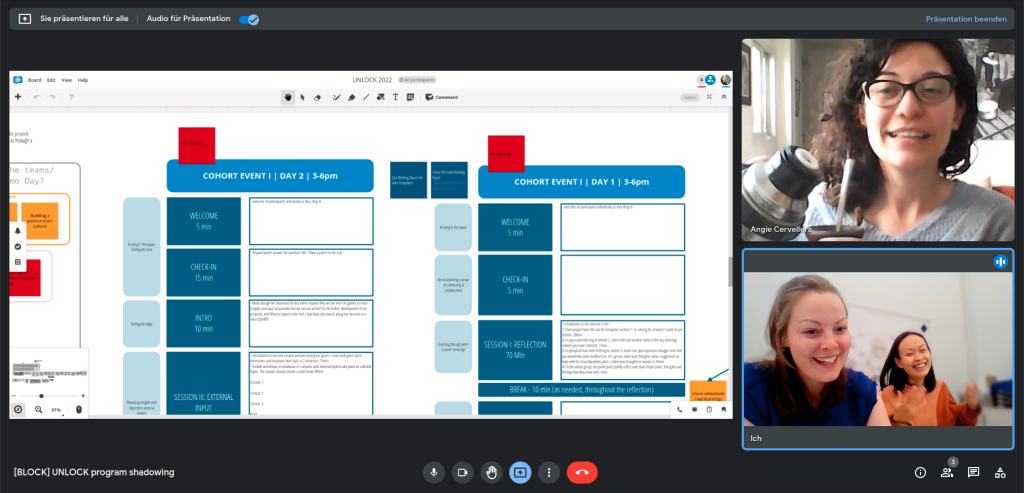Anyone who has ever set up a project knows the time and effort it takes to get through the design phase. Designing for your specific context, according to your means and with your participants in mind is not a task to take lightly. However, it is likely that similar programs already exist that can act either as an inspiration (sparking new ideas) or as a warning (preventing you from making similar mistakes).
So when Wikimedia Argentina approached us, Wikimedia Deutschland, with the ask to share some insights on our UNLOCK Accelerator program in an informal chat, we thought: Well of course. But why stop there?
What it’s all about
Anyone who knows the UNLOCK Accelerator also knows that we love to design major parts of the program on the fly. We do this as a means to give us the utmost flexibility to fully incorporate the needs of our participants as they grow throughout their journey with us. So while the overall arch is set early in advance, we don’t even know the details of what will happen at any given event until we start designing a few weeks prior.
Wikimedia Argentina was in the midst of setting up a new pilot program of their own, Código Cultura, similar to our program in some regards, but placed in a completely different context. Not just because we operate in different countries, nay continents. But also because their participants would have very different backgrounds and needs:
While the UNLOCK Accelerator 2022 addresses social entrepreneurs and open-source activists to make the access to knowledge more equitable in German-speaking regions and the Western Balkans; Wikimedia Argentina was looking to drive innovative projects in the cultural and GLAM (Galleries, Libraries, Archives, Museum) context of Latin-America.
The program shadowing setup
We figured the best way to share our knowledge was through a program shadowing model:
Throughout the 2022 run of the UNLOCK Accelerator we invited Angie and Carolina from Wikimedia Argentina to multiple “How to design an accelerator program”-sessions. There, they could follow along as we designed elements of our program in real time. We also used the space to go through some open questions, give advice and share ideas. It was a space to share knowledge, talk about difficulties and brainstorm what would make more sense in other contexts.
These sessions were complimented by our program events that Angie and Carolina also attended as silent listeners. This gave them the opportunity to see our designs in action and collect their own learnings.

Angie, project manager at Wikimedia Argentina, on implementing her learnings
"From the implementation side, I found that keeping the instructions simple and visually attractive (in my case, a series of deliverables) generates motivation in the participants, activates their creativity, allows them to collectively dump ideas, concepts, proposals, etc., as if it were a big blackboard. I also implemented some of the slogans that Kannika and Lucía had used in their group sessions, with good results. I sought, as in UNLOCK, to promote a relaxed and comfortable space for the participants, where they feel that they are not competing but collaborating with each other. And activities where they could not only get feedback from each other, but also generate feedback for the program itself, collecting interests, concerns, pending learning. It was also important to understand that there are aspects that cannot be foreseen or controlled 100%. I learned from this experience that a level of flexibility and spontaneity is necessary to adapt to what is planned, especially when we are working with people and groups. These aspects were part of the preparatory talks of the events between Kannika and Lucia and then became a reality in practice. I think it is important that, beforehand, we take uncertainty into account as it is not necessarily a negative factor."
The benefits of program shadowing
- The team at Wikimedia Argentina could gain first-hand insights and comprehensive knowledge about how an innovation-driving program like UNLOCK can be designed and implemented. This was a far richer experience and “on-the-job” training – than just reading a “how-to” tutorial.
- We could gain valuable feedback and new perspectives, and thereby prevent being trapped in a rut. Instead, having an outside person viewing our work helped us to find blind spots and further develop the program elements.
- We were able to share specific resources such as methods and templates rather than having to start these from scratch.
- As both programs were implemented alongside the program shadowing (although on different timelines) we could directly compare the designs with the actual implementation of the program elements. This helped us demonstrate how we design for flexibility and always leave room for improvisation. Wikimedia Argentina also acted as an audience member and could feed feedback and ideas directly back to us.
- As we had scheduled our design sessions regardless of the program shadowing it didn’t cause any additional work for us, but fit into our schedule neatly.
Some challenges of program shadowing
- Let’s not keep it a secret: Since we do not speak Spanish and Angie and Caroline do not speak German, the language barrier was real. English worked well for us, but did not come without its limitations. Also, since their program design was done fully in Spanish, we did not have the opportunity to sneak into some of their sessions. We are thankful for free translation tools though.
- This is another obvious one: The time difference left us only few options when to meet. Typically, as Angie and Caroline rolled out of bed extra early, we were already looking forward to the end of the working day. But hey, technology and a strong cup of coffee can make anything happen.
- Since we weren’t entirely sure what would come of this program shadowing, we didn’t over-engineer it and let it develop organically. Next time, we would put more time into co-creating the program shadowing itself, looking into specific needs and how these change throughout the process.
Advice from Angie, Project Manager at Wikimedia Argentina
"I would tell them [people looking to design a program] to investigate first if there are projects similar to theirs and, if they find them, do not be ashamed to write to the referents. The Wikimedia movement is characterized by being collaborative and open, and by building on existing knowledge to improve and replicate it. So, as part of the movement, our actions should be congruent: let us humbly seek spaces where we can learn, test our ideas, contrast them with those of other people and promote improvements in the design and execution of projects."

Overall, we can safely say that the benefits of program shadowing greatly outweigh the challenges and we can only recommend. A personal highlight: Along the way, we not only had great fun, we also learned about each other’s cultures. I now feel much more informed about the mate tea culture in Argentina.

Can you help us translate this article?
In order for this article to reach as many people as possible we would like your help. Can you translate this article to get the message out?
Start translation